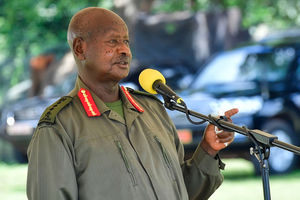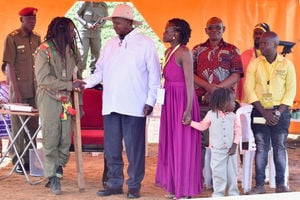
Speaker of Parliament Anita Among (left) and President Museveni during the opening the Northern Uganda regional sitting in Gulu City on August 29, 2024.
President Museveni has asked the people of northern Uganda to utilise the prevailing peace in the sub-region to engage in income-generating activities.
While addressing MPs yesterday at Kaunda Grounds in Gulu City during the regional parliamentary sitting on its second day, Mr Museveni outlined a stream of interventions that the government is currently undertaking to rebuild the northern region.
He gave examples of Masaka and Luweero that were previously devastated by insurgencies but have now significantly developed after focusing on their economic growth.
“In my book, I made it clear that the four-acre model was a rescue operation for the parts of the country with already fragmented land. That’s why I said since you have very few acres (of land) make sure that the mathematics/planning is correct because, without that, you will never get out of poverty,” Mr Museveni said.
He added: “For the four acres, you can have seven activities; coffee, pastures, fruits each taking an acre, and in the backyard, you put poultry for eggs, or piggery and if you are near a wetland, you do fish farming and that can earn our people millions of shillings even on a small acreage.”
Mr Museveni urged residents and leaders to embrace the four-acre model.
“It is intensive agriculture versus extensive agriculture. In my seven activities here (in the book), I don’t recommend cotton, maize, sugarcane, or tea, and people are crying about tea now,” he said.
President Museveni added: “I beg you, I don’t want to brew confusion that Parliament met in Gulu and said to our people to forget the four-acre model since in the north, we have a lot of land, no you don’t have, 10 acres is not a lot of land.”
The President’s second strategy to rebuild the region is to guarantee free and quality education to address the dilemma of jobless youth who have now formed criminal gangs in major urban establishments of the region.
His remark on free education followed a statement by the Omoro Woman MP who said the insecurity brought by street thugs in major urban centres in the region has kept the region in a state of insecurity just like it witnessed during the insurgency, more than two decades ago.
“We still don’t have any peace, there are these thugs (street children) everywhere, they attack innocent people, snatch women’s bags, and kill people…It is one key security question that the government must urgently address,” Ms Lamwaka said.
In his address, the President also said that the government has renewed its efforts to improve the quality of health service delivery in the region as one of the measures to see the region transit from the Lord’s Resistance Army.
“Our strategy was to have health centre III at the county level because most of the sicknesses can be dealt with there. Where the problem is, drugs are being stolen from health centre IIIs… By the time you go for drugs, you have already lost your health,” President Museveni said.
He also wants a starch factory established.
“I want to meet with Rtd Archbishop Odama in the coming days (over the establishment of the starch factory in Acholibur), we promoted a lot of cassava in the north and also in Teso, and the production is very big and now we are getting challenges with marketing,” Mr Museveni said.
Mr Museveni also called for dialogue regarding the livestock compensation issue in the region and rallied the leaders to promote the recently established skilling hubs across the region to train youth with skills that enable them to create their own jobs.
While the north has witnessed remarkable transformation, Ms Annet Anita Among, the Speaker of Parliament, said lawmakers had raised issues regarding the region during the regional sittings such as the need for mindset change as a major catalyst for increased production, the need to embrace a viable cash crop, livestock agriculture, agricultural mechanisation, value addition and sustainable organic farming.
What leaders say
Regarding the cattle compensation, Mr Jackson Kafuuzi, the Deputy Attorney General said delayed release of funds and confusion around the comprehensive data about claimants caused the compensation process to slow down.
“The problem is the numbers keep increasing, we had estimated in our last paper to Cabinet that if we were to do the exercise at once, we would spend Shs2 trillion and yet the initial pledge of government was Shs150 billion, that is, Shs50 billion per sub-region for the three sub-regions,” he said.
Meanwhile, Mr Anthony Akol, the Kilak North MP, said it was unlikely that the establishing a starch factory in Pader District would boost commercial cassava production without adequate funds.
“Concerning the Acholibur Cassava project, in the last Budget Committee sitting money was allocated to this project. But unfortunately when the Appropriation Bill was returned, that funding was removed and right now there is no money for that activity.”




